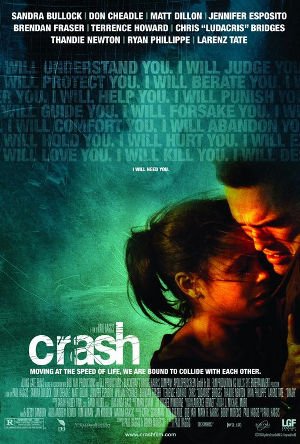- Title: Crash
- IMDB: link
 Racism is a difficult subject to broach cinematically. It’s all too easy to reduce it’s complexities and ignore the underlying reasons for racial tensions all together. Pithy moments of clarity and harsh realizations may make for good viewing, but they hardly touch on the lasting and deep seated effects of our prejudices. Paul Haggis (screenwriter of Million Dollar Baby) makes his directorial debut with Crash, a sprawling look at the seemingly endless well of racism in L.A., but for all its multiple storylines and enlightened moments all that’s left in the end is the idea that deep down we’re all just fundamentally damaged beyond repair, just simmering until that one moment brings our inner racist to the forefront.
Racism is a difficult subject to broach cinematically. It’s all too easy to reduce it’s complexities and ignore the underlying reasons for racial tensions all together. Pithy moments of clarity and harsh realizations may make for good viewing, but they hardly touch on the lasting and deep seated effects of our prejudices. Paul Haggis (screenwriter of Million Dollar Baby) makes his directorial debut with Crash, a sprawling look at the seemingly endless well of racism in L.A., but for all its multiple storylines and enlightened moments all that’s left in the end is the idea that deep down we’re all just fundamentally damaged beyond repair, just simmering until that one moment brings our inner racist to the forefront.
Crash tells the story of a various L.A. residents as they careen into one another in what makes for a mind-boggling series of coincidences. Seemingly random events emerge into a pattern of overlapping storylines which are too rushed and slighted to serve as anything more than a cursory glance at these characters’ lives.
A detective (Don Cheadle) deals with the political bargaining of racism while two beat cops (Matt Dillion and Ryan Phillippe) both transcend and exemplify the almost institutionalized racism of the L.A. police department. A district attorney (Brendan Frasier) spins his recent carjacking to political advantage while his wife (Sandra Bullock) discovers her privileged life is nothing more than a never-ending pattern of anger and fear directed at everyone around her.
A television director (Terrance Howard) and his wife (Thandie Newton) suffer the humiliation of overt and discreet racial bias both professional and personal, while two carjackers expound on the racial overtones of seemingly ordinary events while ignoring their own racist views. And finally, a Persian man’s (Shaun Toub) perceived and experienced attacks result in an unfocused need for revenge.
With Crash’s massive cast, sprawling storylines, and L.A. setting, the comparisons to Paul Thomas Anderson’s far superior Magnolia are pretty easy to make. Haggis further blurs the line by including a montage sequence set to a very Aimee Mann-esque tune and a finale that’s more plausible than a rain of frogs, but just as miraculous. But where Magnolia dealt with our need for personal redemption, Crash gives us characters who are irredeemable. Haggis’s view of racial tension in America is one that’s both incredibly myopic and overly simple. Everyone is a racist in this world. All it takes is the right moment for those prejudices to come through and when confronted with implicit and explicit racial bias, his characters act only in their immediate self-interest seemingly unable to stand up against what they know to be wrong.
To be sure the technical aspects of this film work exceptionally well, as the storylines bleed into one another with ease, and the use of transitions makes for a seamless blend. I can’t imagine I’d have ever praised the acting in a film starring Brendan Fraiser, Sandra Bullock, and Tony Danza, but the performances in Crash work to the extent the writing lets them. Cheadle is excellent as always, as is a surprising Matt Dillion. Rapper Chris “Ludacris” Bridges makes a fine serious film debut as the philosophizing carjacker forced to deal with the damage he commits. Ryan Phillipe’s mostly silent perfomance as the young cop trying to do the right thing only to be confronted with his own misconceptions is particularly powerful, but with so little screen time his character’s actions seem almost random. It’s obvious these actors know they are dealing with an important subject, and they do their best to lend the film what weight and impact it manages to convey, but with so many stories and such a heavy-handed approach to such a delicate subject, it’s impossible for these actors to break out from the thumbnail sketches and caricatures Haggis has saddled them with.
Broken down into ever thinning slices, every life can be reduced to sainthood or damnation. Context is everything. Even the most vile character can be sympathetic when we’re shown their point of view, but Crash relies only on confrontation and it’s after effects to explore it’s characters. The idea that we’re all just one bad moment away from displaying our deepest prejudices is too cynical a conclusion that this film makes again and again. A few lines of expository dialogue is no substitute for context and background, and without them it’s unfair to draw conclusions about characters at their most vulnerable or worst. It would be easy to dismiss Crash as an outsider’s view of American racial relations (Writer/Director Paul Haggis is Canadian), but judging from his work on Million Dollar Baby, Haggis takes a dim view of humanity overall and that almost-misanthropy comes through in nearly every scene.
Crash fits into 100 minutes a subject that even a 12 part mini-series couldn’t do justice, and while I certainly think the state of racial relations in the U.S. is a worthy topic of discussion and exploration, I’m left thinking that perhaps Haggis should have left well enough alone. It’s almost unworthy as a discussion starter, as Crash offers no explanations, alternatives, nor solutions instead merely content to highlight our worst behaviors while ignoring our ability to rise above those instincts.
